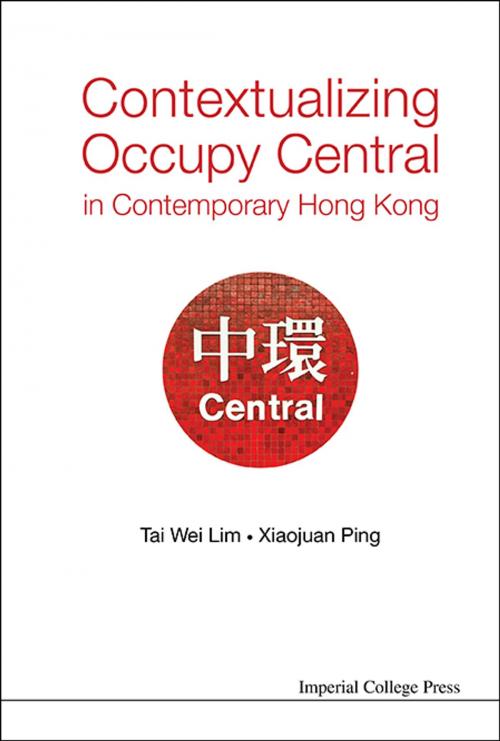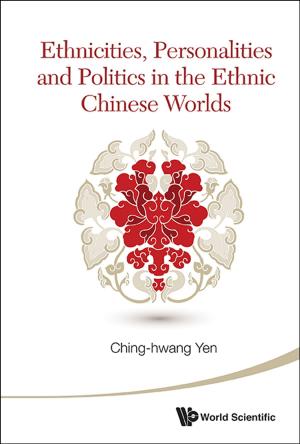Contextualizing Occupy Central in Contemporary Hong Kong
Nonfiction, Social & Cultural Studies, Political Science, Government, Democracy, International| Author: | Tai Wei Lim, Xiaojuan Ping | ISBN: | 9781783267583 |
| Publisher: | World Scientific Publishing Company | Publication: | March 27, 2015 |
| Imprint: | ICP | Language: | English |
| Author: | Tai Wei Lim, Xiaojuan Ping |
| ISBN: | 9781783267583 |
| Publisher: | World Scientific Publishing Company |
| Publication: | March 27, 2015 |
| Imprint: | ICP |
| Language: | English |
In the past 18 years, after the handover of the former British colony Hong Kong to China, Beijing and the Special Administration Region (SAR) have been trying to work out a mutually beneficial relationship based on pragmatism and a focus on economic prosperity. The Occupy Central with Love and Peace in Hong Kong (September to December 2014) movement represents a significant event in Hong Kong's history of public advocacy for change by pro-democracy residents. It is viewed differently by various groups within Hong Kong, including eliciting counter-reactions from an opposing movement.
To contextualize the current discussions, the authors have identified three phases of the movement; and included a historical anatomy of Hong Kong's quest to reach an equilibrium between status quo and changes advocated through its social movements. Though the account does not pretend to be comprehensive, it distils the most significant events in each of the three stages of the movement. Centrist, moderate, and conservative views on Occupy Central, as well as the liberal and progressive positions on the movement are discussed and analyzed in the book.
Contents:
- Preface
- Introduction
- Beijing's initial response to the First Phase (28 September to 6 October 2014) of Hong Kong's Occupy Central Protests
- The Aesthetics of Hong Kong's "Umbrella Revolution" in the First Ten Days: A Historical Anatomy of the First Phase (28 September 2014 to 6 October 2014) of Hong Kong's Umbrella Revolution
- The Hong Kong Occupy Central Protests Phase II
- Centrist/Moderate/Conservative Views of Occupy Movement
- A Liberal and Progressive View of Occupy Movement and a Short Historical Survey of Contemporary Social Movements in Hong Kong and China
- Interview with a Practitioner
- Looking Forward: Immediate/Long Term Implications and Regional Impact
- Phase III of the Occupy Movement Chronology with Black and White Photo Plates
- Conclusion
Readership: Academics, professionals, undergraduates and graduate students interested in China's politics, China's governance, Hong Kong's Pro-Democracy Movement, One Country, Two Systems.
Key Features:
- A unique multidisciplinary approach, combining overseas diaspora studies on Hong Kong's tycoons, with studies of the Chinese political system examined in the context of a social movement
- A timely review of Hong Kong's Occupy Central movement
- Case studies embedded within larger macro-political discussions on the Chinese political system, interactions between its political and socioeconomic elites, and center-periphery political interactions between Beijing and Hong Kong
In the past 18 years, after the handover of the former British colony Hong Kong to China, Beijing and the Special Administration Region (SAR) have been trying to work out a mutually beneficial relationship based on pragmatism and a focus on economic prosperity. The Occupy Central with Love and Peace in Hong Kong (September to December 2014) movement represents a significant event in Hong Kong's history of public advocacy for change by pro-democracy residents. It is viewed differently by various groups within Hong Kong, including eliciting counter-reactions from an opposing movement.
To contextualize the current discussions, the authors have identified three phases of the movement; and included a historical anatomy of Hong Kong's quest to reach an equilibrium between status quo and changes advocated through its social movements. Though the account does not pretend to be comprehensive, it distils the most significant events in each of the three stages of the movement. Centrist, moderate, and conservative views on Occupy Central, as well as the liberal and progressive positions on the movement are discussed and analyzed in the book.
Contents:
- Preface
- Introduction
- Beijing's initial response to the First Phase (28 September to 6 October 2014) of Hong Kong's Occupy Central Protests
- The Aesthetics of Hong Kong's "Umbrella Revolution" in the First Ten Days: A Historical Anatomy of the First Phase (28 September 2014 to 6 October 2014) of Hong Kong's Umbrella Revolution
- The Hong Kong Occupy Central Protests Phase II
- Centrist/Moderate/Conservative Views of Occupy Movement
- A Liberal and Progressive View of Occupy Movement and a Short Historical Survey of Contemporary Social Movements in Hong Kong and China
- Interview with a Practitioner
- Looking Forward: Immediate/Long Term Implications and Regional Impact
- Phase III of the Occupy Movement Chronology with Black and White Photo Plates
- Conclusion
Readership: Academics, professionals, undergraduates and graduate students interested in China's politics, China's governance, Hong Kong's Pro-Democracy Movement, One Country, Two Systems.
Key Features:
- A unique multidisciplinary approach, combining overseas diaspora studies on Hong Kong's tycoons, with studies of the Chinese political system examined in the context of a social movement
- A timely review of Hong Kong's Occupy Central movement
- Case studies embedded within larger macro-political discussions on the Chinese political system, interactions between its political and socioeconomic elites, and center-periphery political interactions between Beijing and Hong Kong















